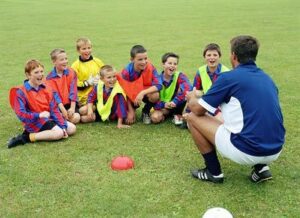
Equal Playing Time in Grassroots Football: Is it time to look for another club?
The result should never be the most important thing in grassroots football at the development stage, but unfortunately this is still the case for the majority. Equal playing time can be an issue for many players and parents.
The result tends to be the baseline for measuring all progress for many. Furthermore, it can hinder the judgement of many coaches that are involved in youth football.
Most notably, coaches are known for only starting their favored players and giving their ‘weaker players’ minimal playing time.
This approach can be very frustrating as a parent. Before considering moving team here are some questions to ask….
What is the Coaching Philosophy?
What Is the goal of the coach? Does the coach use methods that are player centered? Do they just place all their focus on the ‘better’ players in training or do they have a very ‘holistic’ approach?
Finding a good coach in youth football can be difficult. All have their own unique ways and styles and kids can respond very different to ways of the coach. Once you do have one you should think long and hard before deciding to find a new one.
Consider the relationship that the coach has developed with your child. Do they work hard to upskill them in training? Is it effective and can you see progress with their development?
If the answer is yes, then maybe moving to a different team might not be the best option at this time because if there is clear improvement with your child then moving them to a different team could set your child back.
As they improve, you would expect to see them get more minutes on the pitch. If this were not the case, then have a chat with the coach to see what plans they have for your child.
Should all children, regardless of ability, be offered equal playing time?
This statement is taking from Dermot Collins from the FA…
‘Children will get better by taking part and playing. In the Foundation phase the focus should be on developing the individual players rather than results of the team.
In relation to the management of a team this should mean that in a game or over a course of games that a squad of youth players should experience a range of situations – starting, starting as a substitute, coming on as a substitute, being substituted. There should be an aim to offer all squad players comparable game time.
However, we believe this approach should be based on a developmental ethos rather than regulation imposed by a stop watch. We believe that Clubs should clearly set out their selection and game time policies, so that parents are aware of the approach taken and can take this into account in selecting a club that meets the needs of their child or children.
A failure to offer equal playing time has a direct correlation on players enjoyment and leads to drop out from the game.’
Equal playing time on the pitch
Playing time for your child is especially important as you want to see them use what they have learned in the game. If they are not being given enough time, how can they apply what they have learned and develop appropriately?
Just because they may not be starting every game doesn’t mean they are not getting equal game time to other players. If it’s a real concern, take note of the ‘minutes’ that your child is on the pitch and compare it to the other players.
In England, Youth football has a roll-on, roll-off substitute system. In effect, this should makes it a lot easier for coaches to equally share playing time throughout the season. Question whether your coach is utilizing this effectively?
What will be the impact of moving teams?
Consider also what lessons moving teams might teach your child. Indeed, in life sometimes you have to work harder at your game to achieve what you want.
Moving to a new team could result in more opportunity and more game time, however, in life situations it may not always be the best solution to ‘jump ship’ and the grass may not always be as greener, so to say.
If you believe that the coach is still developing your child even though they are not starting as much, then this should be an important factor.
Sometimes experiencing a little adversity teaches them many lessons that help make them an even better player.
It can help them realize that having a desire to improve themselves all the time is an important requisite for a player to succeed.
Sometimes as parents, we want to always protect our children from pain and disappointment too quickly before assessing what they could learn from it.
In many situations the lessons learned can help propel them to new levels, we must be willing to let them fall and pick themselves back up with a little guidance from ourselves. This is our role as parents.
The right environment
Child relationship and the right environment are also key to your child’s success and development. Building relationships in youth football team can be difficult for many, especially as a new player coming into an established group.
Before leaving a team, consider whether they have positive relationships with the other players? If so, how difficult will this make it if you do decide to leave the team?
The culture of the team, which comes from the coach, the philosophy and the players is a key factor in terms of enjoyment and development.
You will need to weigh up what’s most important; whether to stay with friends at the expense of game time and ultimately development. Or, take the risk of a new challenge in a new environment but with the potential to grow and develop.
Summary
There is indeed much to consider before deciding to move to a different youth football team, as a result of a lack of game time opportunity. In the first instance, we would recommend speaking to your team’s coaches to understand the reasons behind the lack of playing opportunity.
Sometimes taking the time to investigate the reasons behind it and understanding the methods of your coach can help you make the best decision for your child.
Although they may not be starting every game, how many minutes do they get on the pitch? Are they developing and does the coach work hard at building relationships with each player?
It’s true that we can’t shield our children from everything. Indeed, sometimes its helps them to experience a little adversity and it can help make them better players and strengthen their character.
It is for our judgement as a parent to assess the potential impact of it beforehand and make that decision. This helpful guide may answer a few questions you may have.








